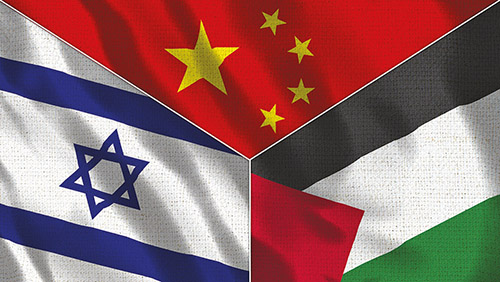
In contrast to its longstanding policy of non-interference in external conflicts, it seems that Beijing is increasing its involvement in the Israeli-Palestinian conflict—supporting the Palestinian cause, at Jerusalem’s expense. What lies behind this Chinese move: genuine concern for the fate of the Palestinians, or other interests? Should Israel rethink its route regarding its relations with China?
In July 2021, Chinese Foreign Minister Wang Yi visited Syria, Egypt and Algeria, and met with senior officials of the Arab League. This was Wang’s second visit to the Middle East this year, following his March visit to six countries: Saudi Arabia, United Arab Emirates, Oman, Bahrain, Iran and Turkey. In addition to trade matters, the visits dealt with three main topics: promoting the distribution of Chinese COVID-19 vaccines; Chinese investments in the framework of the “Belt and Road” initiative; and the Israeli-Palestinian conflict.
After selling and donating Chinese vaccines and medical equipment to countries in the region, China wants to encourage the establishment of local manufacturing facilities. During the visit to the UAE, Wang launched a factory to manufacture 200 million doses a year of the Sinopharm vaccine. In Egypt, the minister officially inaugurated a factory producing Sinovac vaccines, which began operations a month earlier and is expected to manufacture some 40 million doses a year. The establishment of a third facility, also for Sinovac, was announced during the visit to Algeria. The distribution of the vaccines is important to China, which seeks to restore its image, damaged by the pandemic; derive economic benefit; and leverage the move as a means of political influence.
“Belt and Road” is a flagship initiative personally promoted by the Chinese president and embodies a central Chinese interest. The initiative, which encompasses a range of projects worldwide, is used by China to form a kind of global club under its leadership, in the name of a vision of world harmony, collaboration and unity—“a community of common destiny for mankind.” In Algeria, Wang declared that “China will always be a member of the camp of developing countries, and breathe the same air and share a common destiny with the developing countries.” This utopian vision, which includes calls for “sovereign equality” and non-interference in the internal affairs of countries and also promises future investments amounting to $750 billion, is enticing to many countries, particularly the developing ones, which are in crisis or desperately in need of investment. No fewer than 139 countries have joined the initiative, including 17 from the Middle East and North Africa.
All the countries visited by Wang have already joined the initiative, but China’s interests in them are different. In March, the visit included the Gulf states as well as Iran and Turkey, all of which have stable regimes—most with strong economies—and in which China has multiple investments and is eager for more. On the other hand, the July visit involved countries that were “affected by the Arab Spring.” Two of them, Syria and Algeria, are going through long and deep crises, and Chinese companies are reluctant to invest heavily there. Egypt is stable and more important to China but also needs strong investment in infrastructure, and its economic abilities lag far behind those of its neighbors in the Gulf.
Chinese investments are tailored to the needs of the destination countries, as well as to Chinese interests. For example, in Turkey, the Chinese foreign minister stressed the need to strengthen the “Middle Corridor project”—an initiative of Kazakhstan, Georgia and Azerbaijan to develop a trans-Caspian transport route linking Eastern Europe with China via Turkey, the Caucasus, the Caspian Sea and Central Asia. He also called for cooperation on hi-tech, 5G and the digital economy.
In the Emirates, he spoke about expanding cooperation in the fields of energy, hi-tech and new technologies, and in Bahrain, he talked about cooperation as part of the Belt and Road initiative in energy, 5G, infrastructure, e-commerce and big data. In contrast, in the developing countries that he visited in July, he confined himself largely to general statements about the need to expand cooperation under “Belt and Road.” By promoting investments in developed countries in the fields of infrastructure and advanced technologies, which are important to China, and by declarations that arouse hope in developing countries, China wishes to strengthen its influence in the Middle East, enlist the support of countries in the region, and generally improve its image, while the United States appears to be retreating from the region.
The third principal issue during the visit was the Israeli-Palestinian conflict—China tends to raise the issue in various international forums and at meetings with Arab leaders. Chinese statements show that it sees the Palestinian issue as the heart of the Middle East’s problems, and lasting peace and security to the region depend on its resolution. Accordingly, the issue was mentioned at all the minister’s meetings, and at two of them, action plans were also presented. In Saudi Arabia in March, Wang presented a Five Point Plan to achieve peace and security in the Middle East. After stating the general need to “support mutual respect,” the minister spoke of China’s intention to raise the ongoing dispute at the U.N. Security Council, support the two-state solution, and invite peacemakers on both sides for talks. During his visit to Egypt in July, he put forward three ideas for achieving two-states: enhancing the status of the Palestinian Authority; supporting the unity of Palestinian factions; and encouraging the resumption of peace talks based on the two-state solution.
This is not the first time that China has invited representatives of both sides to such talks, or raised plans with varying numbers of points to resolve the conflict. However, during Operation Guardian of the Walls in May, China departed from its “non-interference” policy, whereby it generally avoids taking a side in disputes. It summoned meetings of the U.N. Security Council, formulated declarations and supported resolutions condemning Israel. Foreign Minister Wang himself addressed the Security Council and declared that the two-state solution is the “ultimate way out” to end the conflict, and repeated his invitation to “peacemakers” from both sides.
Indeed, about a month later such talks took place, with the participation of Israeli representatives that included Yossi Beilin, Michal Rozin, Israela Oron and Gadi Baltiansky. Two of them were formerly Meretz Members of Knesset, and three are among the heads of the Geneva Initiative to promote a permanent settlement between Israel and the Palestinians. The Palestinian delegation was led by Ahmed Majdalani, the minister for social development, a member of the PLO executive committee, and the general secretary of the Popular Struggle Front, which is linked to Fatah.
In other words, from both sides, China invited people who are used to talks but lack any political authority. The participants in the previous talks initiated by China had similar backgrounds, so it is clear that China’s efforts are symbolic in intent, for image rather than practical purposes. Wang himself in his speech at the Security Council differentiated between the “peacemakers” who were invited to a “dialogue” and the “negotiators” from both sides who were invited to “direct talks” in China.
China thus identifies the Israeli-Palestinian conflict as material for positive rhetoric for Arab and Muslim audiences. Through its recurrent reference to the dispute and “the legitimate rights of the Palestinian people in the occupied territories,” the invitation to talks in Beijing and meetings of “peacemakers,” China seeks to create the image of a responsible power that stands beside an oppressed minority and offers to help achieve a solution for the benefit of both sides. Thus, the Israeli-Palestinian conflict joins the list of topics that China can use to taunt the United States, while also playing down criticism of its own treatment of its Uyghur minority. During Operation Guardian of the Walls, when the United States objected to the wording of the U.N. Security Council statement against Israel that was drafted by China and other Security Council members, Foreign Minister Wang commented that the United States stands “on the opposite side of international justice” (but did not mention Britain, which also objected).
Israel observed Wang’s visits to the Middle East with a certain lack of interest. Past experience shows that China is quick to declare support but is generally satisfied with symbolic actions only, and there is little likelihood of a rush of Chinese companies to rebuild the ruins of Syria, just as there is little expectation of imminent significant investment in the Gaza Strip. On the other hand, China’s growing assertiveness in international organizations is not expected to wane, and it will probably continue to support the Palestinians, necessarily at Israel’s expense.
So far, Israel and China have been fairly successful at maintaining a policy that separates economic relations and mutual benefits from political disagreements. Thus, China continues to support Iran and the Palestinians, with no significant harm to its economic relations with Israel, and at the same time continues its economic relations with Israel while being aware of Israel’s special relationship with the United States.
But as the rivalry between China and the U.S. grows, Beijing is expected to step up its efforts to cast Washington as a two-faced and irresponsible power while brushing away any criticisms relating to human rights. In this sense, the Israeli-Palestinian conflict is very useful, and China’s position has broad international support even among some U.S. allies. China’s support for Iran, its increasing assertiveness in international organizations, and its use of the Israeli-Palestinian dispute to taunt the United States could create problems for relations between Jerusalem and Beijing, and even lead Israel to reexamine its relations with China.













